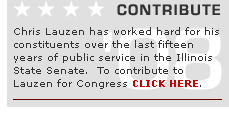The debate scorecard
Rick Nagel, Editor-Publisher
• Who won: Lauzen
• Major points: Lauzen scored in opening remarks when Oberweis went into attack mode. Comments played to Lauzen's man-of-the-people theme.
• Overall: Lauzen looked more polished and personable. Came across as compassionate conservative. Could be a turning point in the primary race for the guy many consider the underdog.
Denise Crosby, Managing Editor
• Who won: Lauzen
• Major points: Whatever high-priced political consultant Oberweis hired to help him with this debate should probably be demoted, if not fired. His strategy of jumping straight out of the chute in attack mode backfired, to the point of being downright embarrassing.
• Overall: The fact Lauzen stayed above the fray earned big points for the state senator. And, in spite of his reliance on note cards, Lauzen still managed to come across as less rehearsed, more sincere and more in this race for the common man.
Dave Parro, Opinions Editor
• Who won: Lauzen
• Major points: Oberweis tried his hardest to poke holes in Lauzen's record of service, but the state senator successfully fended off most attacks.
• Overall: Not much separates these two when it comes to the issues. But Lauzen's "man of the people" message resonated.
by Andre Salles, Beacon News --
AURORA -- The two lead Republican candidates in the race to replace Dennis Hastert faced off Tuesday night, and after weeks of negative campaigning, it didn't take long for the attacks to begin.
The debate, housed in Aurora University's Crimi Auditorium and sponsored by The Beacon News and CBS-2, started with opening statements, and Oberweis used his entirely to criticize Lauzen for taking repeated campaign contributions from a company under investigation by the Illinois attorney general's office.
"It's about judgment," Oberweis said. "Chris, you can't fix the problem if you don't see the problem."
Last month, Lauzen returned nearly $100,000 in contributions from International Profit Associates, a consulting firm based in Buffalo Grove, and its owner, John Burgess. IPA is under investigation by the Illinois attorney general's office, and federal authorities are in the midst of a sexual harassment lawsuit against the company on behalf of 100 employees.
And Burgess was convicted in the 1980s of attempted larceny and patronizing a 16-year-old prostitute, according to published reports. Burgess and IPA have been donating to Lauzen and his campaign since 1998, and other politicians, including Gov. Rod Blagojevich, have returned similar contributions from the company.
Lauzen, however, stayed above the fray, and used his opening two minutes to talk about his 15 years in the Illinois State Senate. He did, however, characterize the race as a struggle between "big money and big clout and the rest of us in the grass-roots."
Though the candidates stayed on point for the majority of the debate, the combative tone remained, both Oberweis and Lauzen repeatedly accusing the other of misrepresenting their positions.
But along the way, voters in the 14th District got to hear the candidates' thoughts on immigration, education, the Iraq war, health care, abortion and federal earmarks, among other topics.
The duo answered questions from a variety of sources. Some questions were formulated by The Beacon News editorial board, some sent in by Beacon readers and some written down by audience members Tuesday night.
Voters learned that neither Lauzen nor Oberweis supports amnesty for illegal immigrants, and both object to children of illegal immigrants born in the U.S. automatically becoming citizens. The candidates agree that the health-care system needs work.
They both oppose additional regulations on American businesses. They are both opposed to abortion, and neither one would reauthorize the No Child Left Behind Act without significant changes.
They differed only a few times. Oberweis supports free and open trade with other countries, while Lauzen prefers a trade system that does not encourage what he calls unfair competition. And Lauzen is opposed to the Prairie Parkway, while Oberweis sees it as part of the solution for Kendall County.
The attacks intensified when the candidates were each asked about their recent direct-mail pieces. Lauzen did address the contributions from Burgess and IPA, saying that he gave the money back without being asked and characterizing Oberweis' attack as "a cruel, politically motivated lie."
And Oberweis responded to Lauzen's "dead cow" mailer, in which he stated that a previous Oberweis campaign had been fined by the FEC for using funds from Oberweis Dairy for political advertising. Essentially, the issue was whether Oberweis himself could appear in ads for his dairy while running for political office.
Oberweis said that the $21,000 was a "civil penalty" agreed upon by all parties to avoid litigation and noted that the campaign never paid a cent -- the penalty was paid by the dairy.
In the end, Lauzen touted his experience over 15 years in office and criticized Oberweis for spending millions on previous failed campaigns. And Oberweis pointed to Hastert's endorsement, calling himself the candidate who can get things done, and said Lauzen has had too much practice being a politician.
The race will likely remain heated through the Feb. 5 primary election, and the candidates are slated to meet several more times before then.









